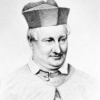Frederick William Faber

Frederick William Faber
Frederick William Faber Cong. Orat.was a noted English hymn writer and theologian, who converted from Anglicanism to the Catholic priesthood. His best-known work is Faith of Our Fathers. Though he was a Roman Catholic writing for fellow Catholics at that point, many of his hymns today are sung by Protestant congregations...
NationalityBritish
ProfessionTheologian
Date of Birth28 June 1814
christian disappointment buried
There are no disappointments to those whose wills are buried in the will of God.
thinking kind-thoughts judgemental
Kind thoughts are rarer than either kind words or deeds. They imply a great deal of thinking about others. This in itself is rare. But they also imply a great deal of thinking about others without the thoughts being criticisms. This is rarer still.
motivational opportunity long
Remember that if the opportunities for great deeds should never come, the opportunities for good deeds are renewed day by day. The thing for us to long for is the goodness, not the glory.
kindness men self
Kindness is too often left uncultivated, because men do not sufficiently understand its value. Men may be charitable and not kind; merciful, yet not kind; self-denying and yet not kind. If they would add a little common kindness to their uncommon graces, they would convert ten where they now only abate the prejudice of one.
temptation victory resistance
Every moment of resistance to temptation is a victory.
grace listening kind
There is a grace of kind listening, as well as a grace of kind speaking.
facts life-is
The great fact is, that life is a service. The only question is, "Whom will we serve?
faith kindness eloquence
Kindness has converted more sinners than zeal, eloquence, or learning.
converted hence men religious speaking
If I may use such a word when I am speaking of religious subjects, it is by voice and words that men 'mesmerize' each other. Hence it is that the world is converted by the voice of the preacher.
friendship rested
Many a friendship, long, loyal, and self-sacrificing, rested at first on no thicker a foundation than a kind word.